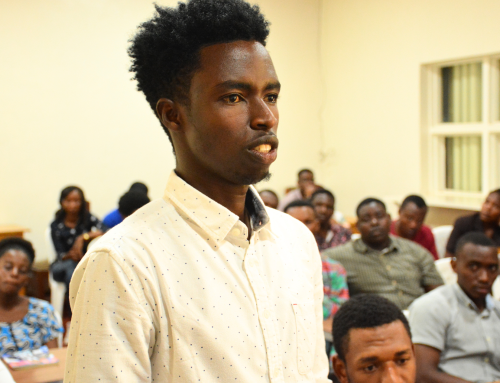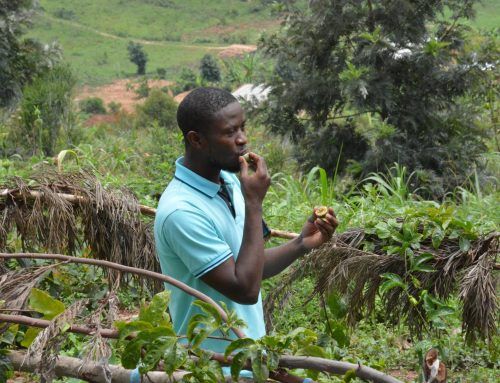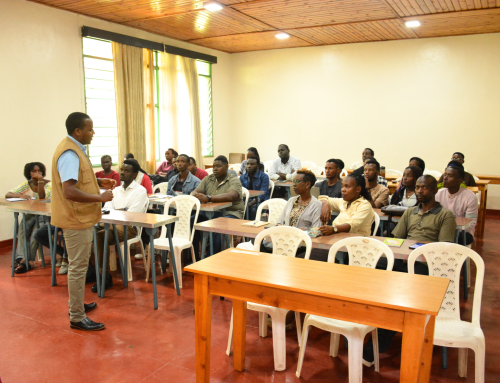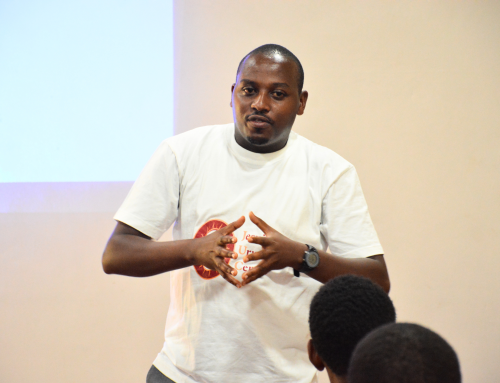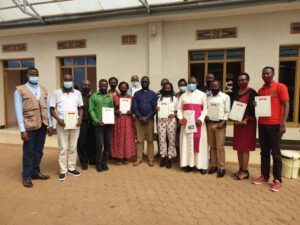 After days of long waiting because of the pandemic Covid-19 that halted activities in Rusizi district, JUC was finally able to reach Cyangugu diocese as part of the Centre’s country tour of workshops on Catholic Social Teaching. From 17th to 19th November 2020, on the premises of Centre Diocésain de Pastorale Incuti, Jesuit Urumuri Centre conducted a workshop on Catholic Social Teaching (CST) for the workers of the diocese. Participants came from various apostolates of the diocese: Justice and Peace, Family, Catholic education, Youth, Caritas, and the Pastoral coordination office. Like in previous workshops, the modules of the training consisted on the theological foundation of CST, historical development of CST, principles of CST, thematic study of CST, and the pastoral circle and methodological approach to advocacy from CST perspective.
After days of long waiting because of the pandemic Covid-19 that halted activities in Rusizi district, JUC was finally able to reach Cyangugu diocese as part of the Centre’s country tour of workshops on Catholic Social Teaching. From 17th to 19th November 2020, on the premises of Centre Diocésain de Pastorale Incuti, Jesuit Urumuri Centre conducted a workshop on Catholic Social Teaching (CST) for the workers of the diocese. Participants came from various apostolates of the diocese: Justice and Peace, Family, Catholic education, Youth, Caritas, and the Pastoral coordination office. Like in previous workshops, the modules of the training consisted on the theological foundation of CST, historical development of CST, principles of CST, thematic study of CST, and the pastoral circle and methodological approach to advocacy from CST perspective.
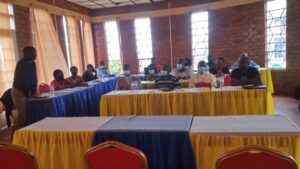 In Cyangugu diocese, the group has been waiting for this training for almost year and the eagerness to enjoy the fruits of the workshop were expressed throughout the training. On the very first day, when asked to share in group discussions about joys and pains lived in being associated with the pastoral works of the diocese, participants marveled at how triggering the workshop was. They were prompted to reflect on why they chose to do the work they do even when the remunerations they earn are not that competitive in relation to the “outsider” world. For many, though man earns his living through his work, their involvement in the diocese’s work surmounts pecuniary rewards.
In Cyangugu diocese, the group has been waiting for this training for almost year and the eagerness to enjoy the fruits of the workshop were expressed throughout the training. On the very first day, when asked to share in group discussions about joys and pains lived in being associated with the pastoral works of the diocese, participants marveled at how triggering the workshop was. They were prompted to reflect on why they chose to do the work they do even when the remunerations they earn are not that competitive in relation to the “outsider” world. For many, though man earns his living through his work, their involvement in the diocese’s work surmounts pecuniary rewards.
Another insightful questioning that arose from group discussions is the importance of natural family planning. In fact, those in the family apostolate shared about the joy they experience when they see couples embracing natural family planning. There is a general tendency to think of natural birth spacing as utopian, yet so many testimonies from couples bear witness to the contrary. Natural family planning is common, though many think of it as even impossible.
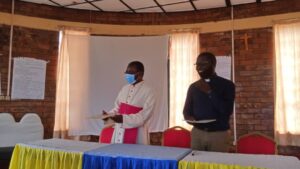 In concluding the workshop, the closing ceremony was a unique moment of joy and celebration in the presence of the bishop. In his concluding remarks, the director of Justice and Peace Commission reminded participants that the purpose of the workshop was two-fold: first, for those trained to benefit for that unique knowledge about CST and use it in their lives and work, and secondly, to be multipliers by thinking of training others at parish levels.
In concluding the workshop, the closing ceremony was a unique moment of joy and celebration in the presence of the bishop. In his concluding remarks, the director of Justice and Peace Commission reminded participants that the purpose of the workshop was two-fold: first, for those trained to benefit for that unique knowledge about CST and use it in their lives and work, and secondly, to be multipliers by thinking of training others at parish levels.
In his remarks, the bishop who was happy to take part in closing ceremony of the workshop, since he missed the same in Gikongoro diocese, reminded the participants that they have been introduced to CST and what they had received was an invitation to go read more in order to be fully equipped to train others. He then awarded 13 certificates of completion of the workshop to those who had regularly and fully completed the five modules. Like in any normal class-like setting, some trainees did not qualify for the certificates awards due to irregularity in participation.







